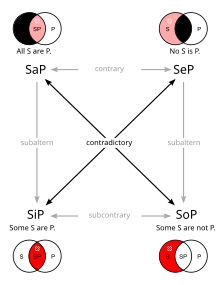
Back تناقض (منطق) Arabic ناتەبایی CKB Kontradikce Czech Kontradiktion Danish Kontradiktion German Kontraŭdiro (filozofio) Esperanto Contradicción Spanish تناقض Persian Contradiction French סתירה (לוגיקה) HE
This article needs additional citations for verification. (July 2008) |

In traditional logic, a contradiction occurs when a proposition conflicts either with itself or established fact. It is often used as a tool to detect disingenuous beliefs and bias. Illustrating a general tendency in applied logic, Aristotle's law of noncontradiction states that "It is impossible that the same thing can at the same time both belong and not belong to the same object and in the same respect."[1]
In modern formal logic and type theory, the term is mainly used instead for a single proposition, often denoted by the falsum symbol ; a proposition is a contradiction if false can be derived from it, using the rules of the logic. It is a proposition that is unconditionally false (i.e., a self-contradictory proposition).[2][3] This can be generalized to a collection of propositions, which is then said to "contain" a contradiction.
- ^ Horn, Laurence R. (2018), "Contradiction", in Zalta, Edward N. (ed.), The Stanford Encyclopedia of Philosophy (Winter 2018 ed.), Metaphysics Research Lab, Stanford University, retrieved 2019-12-10
- ^ "Contradiction (logic)". TheFreeDictionary.com. Retrieved 2020-08-14.
- ^ "Tautologies, contradictions, and contingencies". www.skillfulreasoning.com. Retrieved 2020-08-14.
© MMXXIII Rich X Search. We shall prevail. All rights reserved. Rich X Search
